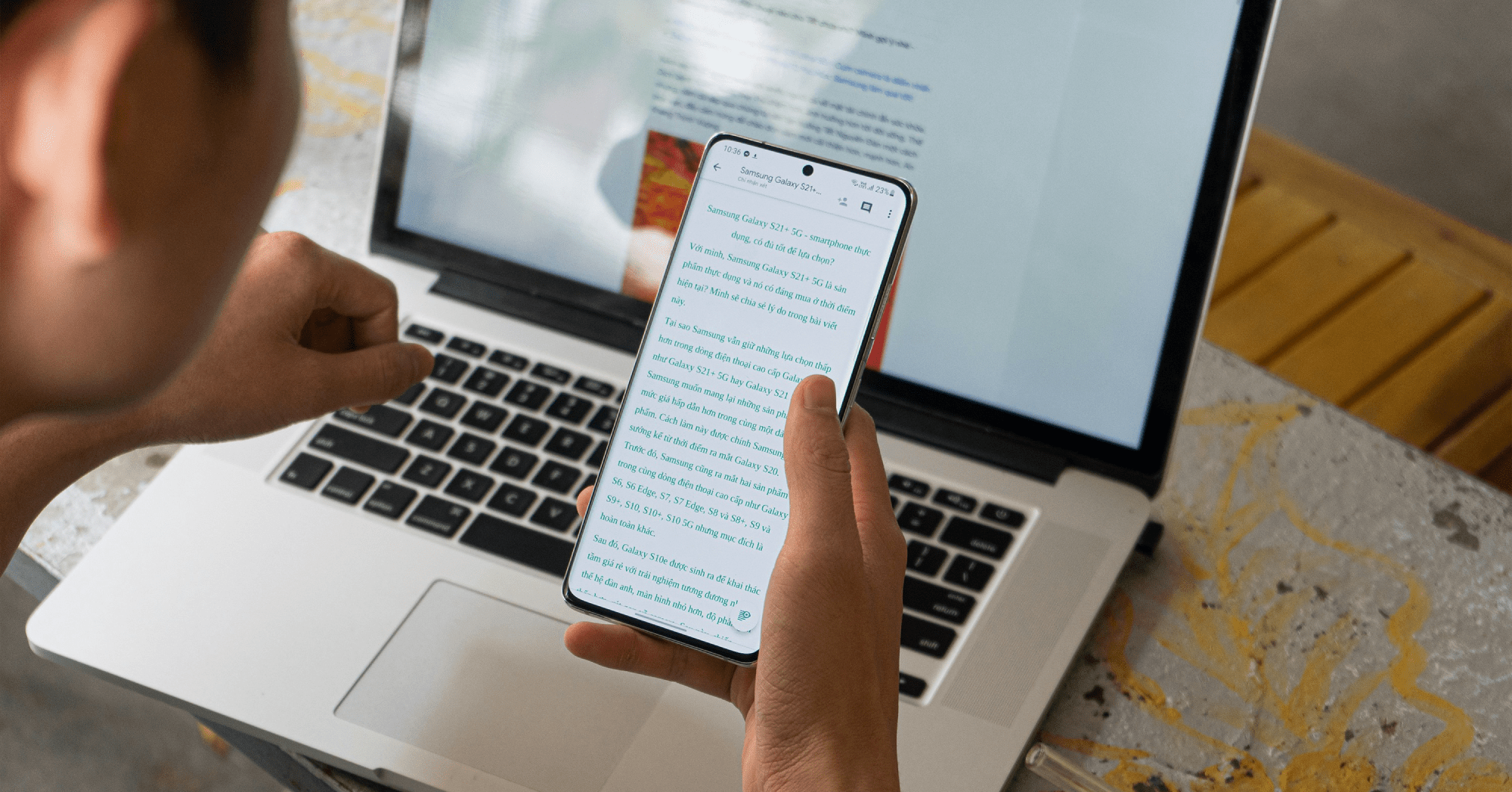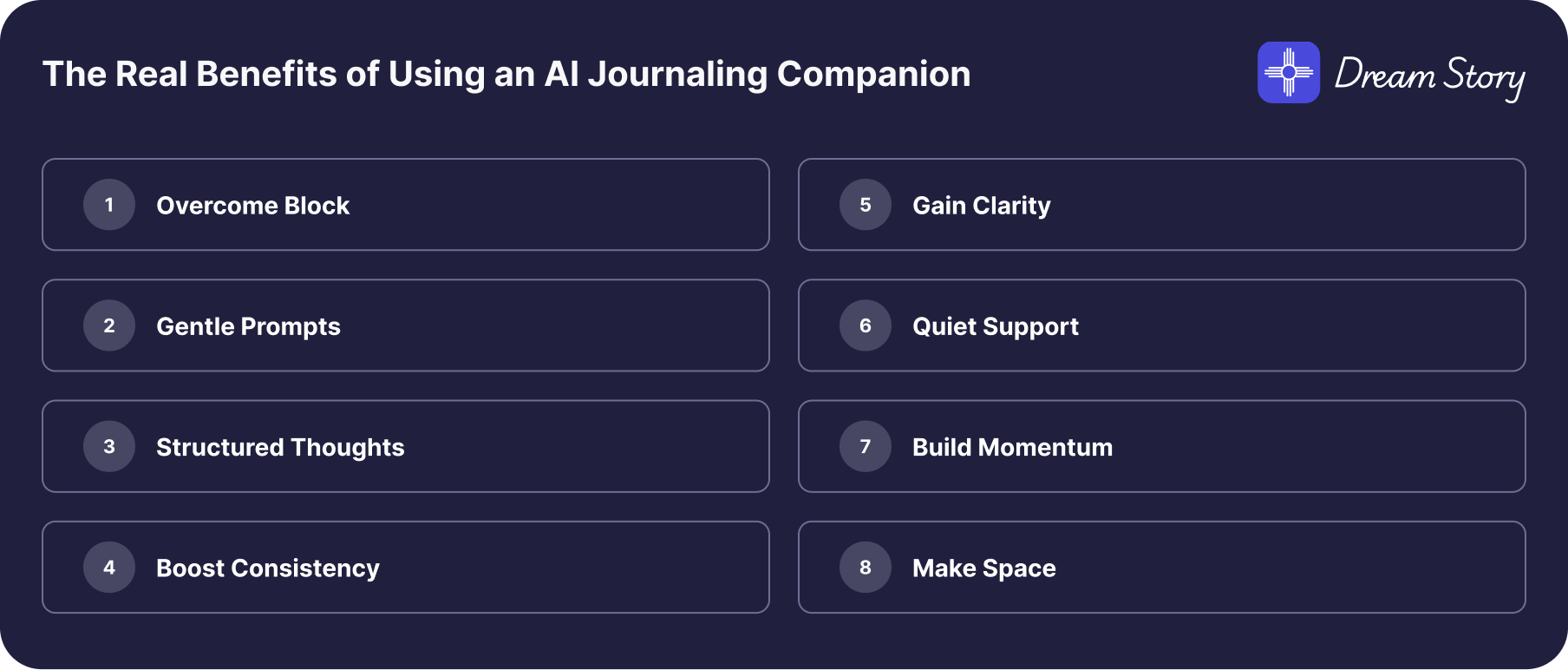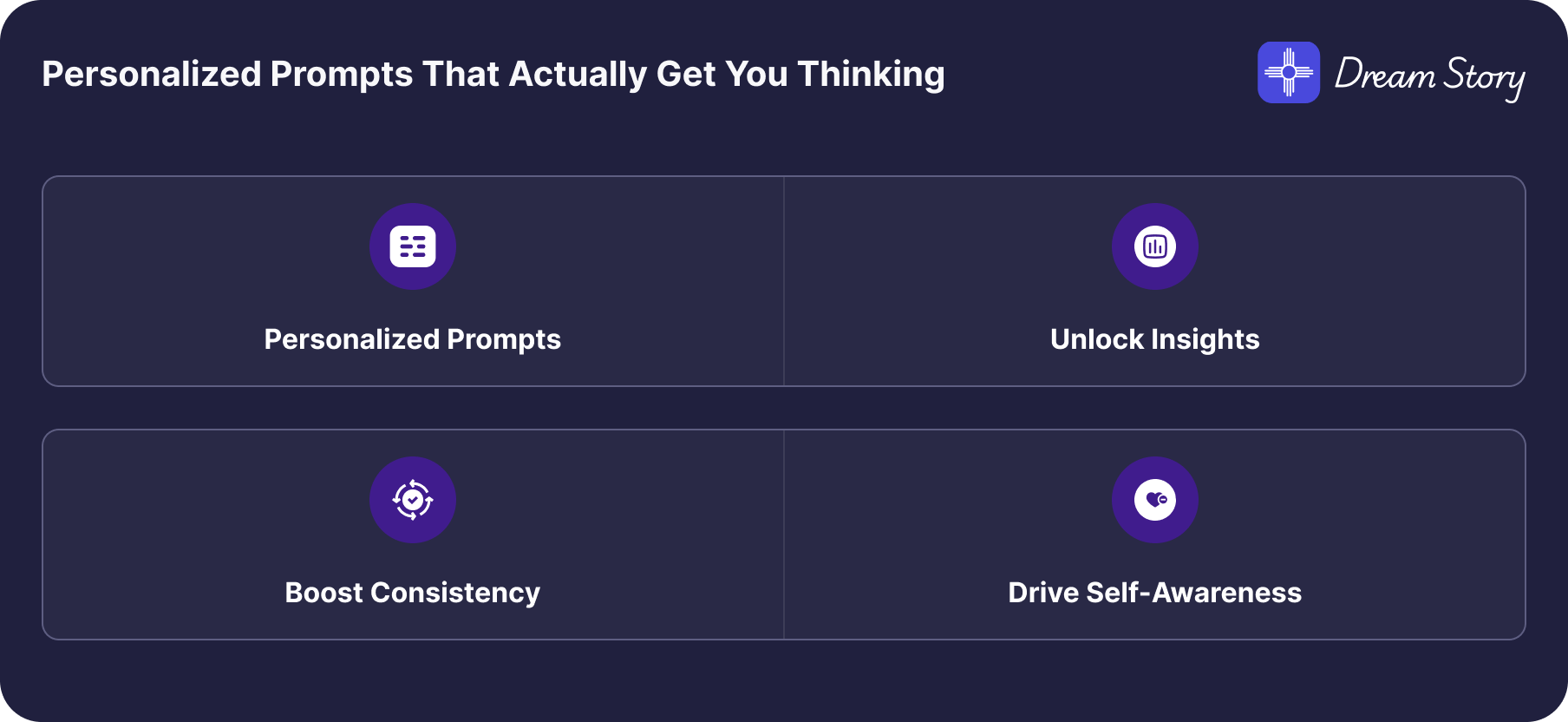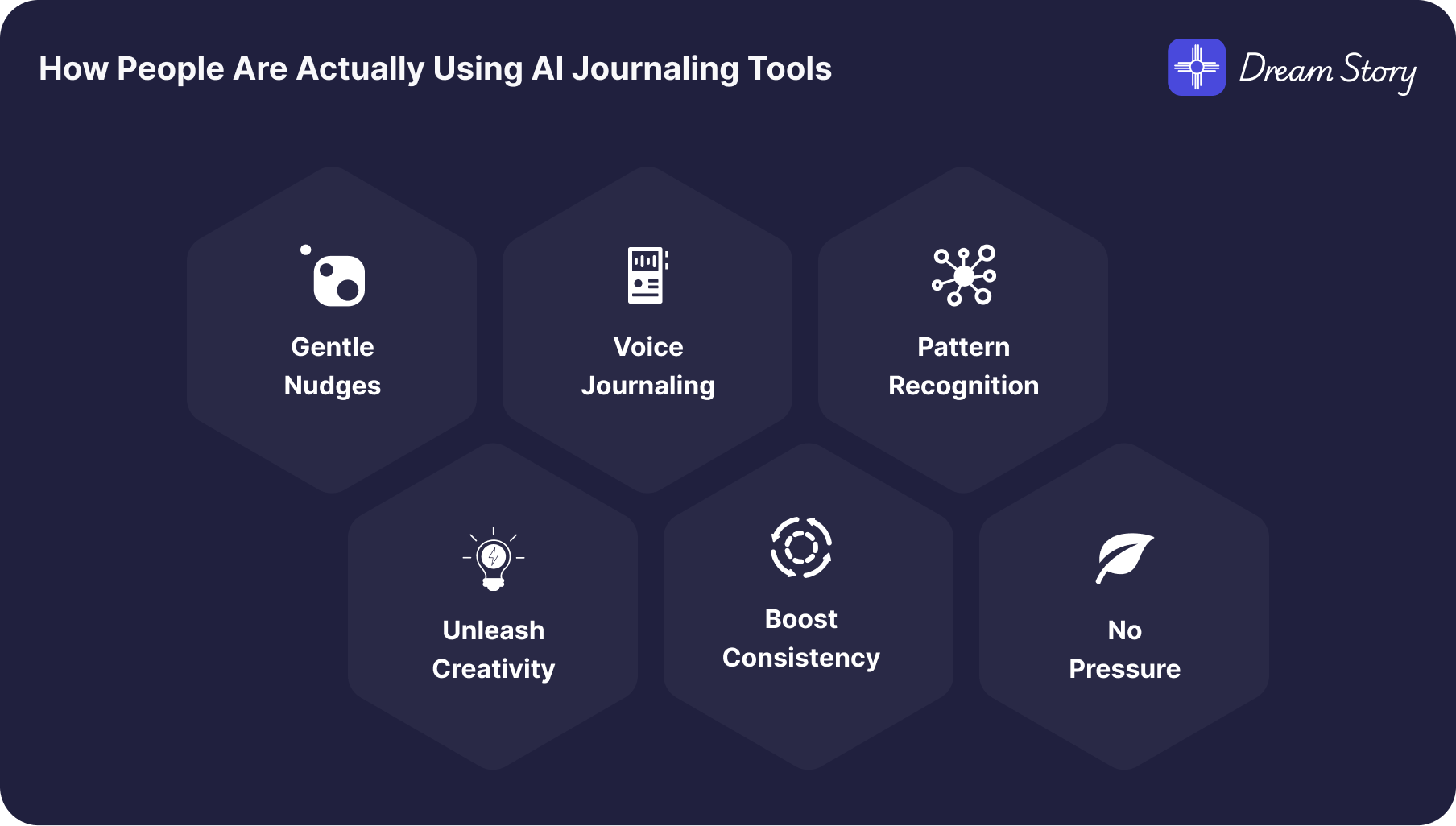The Rise of AI in Digital Journaling for Creativity & Growth
Last updated on - 09 July, 2025

You’ve probably seen all the buzz around AI tools lately - some of it exciting, some of it kind of overwhelming. In a lot of areas, AI feels like it’s trying to take over tasks entirely. But journaling? It’s different. AI in journaling isn’t there to take the wheel. It’s there to ride shotgun—to offer a gentle nudge when your brain feels stuck or scattered.
Let’s say you open your journaling app and you’re met with a totally blank page. That can be kind of daunting. But then, instead of just staring into the void, the app throws you a prompt like, “What’s something that felt harder than it should’ve this week?” or “Who made you smile recently, and why?” Suddenly, you’re not lost. You’ve got a direction, and that’s often all it takes to start your creative writing.
Apps like Dream Story Live take this even further. One of its most surprisingly emotional features is the ability to look back on past entries from the same date—but across different years. It’s a bit like emotional time travel. You might open it up on a random Tuesday and read something your past self wrote on that same Tuesday in 2022 or 2023. Sometimes you laugh. Sometimes you cry. But almost always, it gives you a moment of perspective and self discovery you didn’t expect to have.
And the best part? There’s no pressure. AI doesn’t scold you if you skip a day. It doesn’t care if you only write two sentences. It just quietly shows up when you do—with a prompt, or a quote, or a reminder that says, “Hey, this space is still here for you.”
The whole experience feels less like a productivity hack and more like building a little ritual with yourself—one that fits into real life, even when real life is messy.
The Real Benefits of Using an AI Journaling Companion

If you’ve ever tried to stick with journaling, you already know that starting is the hardest part. You sit down but your mind’s all over the place and suddenly the idea of writing anything feels like one more thing on an already packed to-do list.
One of the biggest shifts I noticed when I started using something like Dream Story Live was how much more doable journaling became. On days when I had no idea what to say, it would offer up a soft prompt — something simple like “What’s been taking up space in your mind lately?” And weirdly enough, that was usually enough to help me start untangling things. Dream Story doesn’t try to be flashy or overly smart. It’s quiet support — a nudge to your critical thinking when you're stuck, a soft structure when your thoughts feel chaotic. And over time, that kind of gentle guidance actually builds momentum for your journaling process. You journal more often, not because you have to, but because you want to.
Another big win: organization. You know how some days your brain feels like a mess of tabs left open all at once? Dream Story helps with that. It helps you take those jumbled thoughts and turn them into something you can actually understand. Not fix, necessarily — just see. And honestly, sometimes that’s all you need. So no, these AI tools won’t solve all your problems. But they will help you make space for your thoughts more often. And if you’re like most of us, that’s already a pretty huge step in the right direction.
Personalized Prompts That Actually Get You Thinking

If you’ve ever sat down with your journal and thought, “Okay… now what?” — you’re definitely not alone. That blank page can feel like a wall, especially on tough days when your brain is already overloaded. That’s where AI-generated dynamic prompts can be surprisingly helpful. And I’m not talking about generic stuff like “Describe your day.” I mean real, thoughtful prompts that actually reflect who you are, how you write, and what’s been on your mind lately giving you the sense of self discovery.
Dream Story Live has a feature called Prompt Suggestions — and it’s honestly one of the reasons I stuck with journaling in the first place. On days when I felt like I had nothing to say, the app would quietly ask something like, “What tested your patience today?” or “What’s one thing you did this week that you’re proud of?” The questions are never too heavy, but they’re almost always enough to unlock something — especially when you’re tired, distracted, or just not in the mood to dig deep on your own. What's really cool is that the prompts evolve. As you use the app more, it picks up on your writing patterns — like when you tend to write about work stress, or how your tone changes when you talk about certain people or habits. It doesn’t judge. It just gently nudges you toward noticing those patterns, too.
That kind of personalized prompting does more than help you fill a page:
- It helps you notice the emotional cycles you tend to repeat (even the subtle ones).
- It makes it easier to stick with journaling regularly, because the questions actually feel meaningful.
- And it often leads to those small but powerful moments of self-awareness — where you finally connect a few dots, or realize what’s been weighing you down.
Over time, those valuable insights add up. You start to know yourself better. You start making clearer choices. And journaling shifts from being a thing you’re trying to do into something you actually look forward to. So if you’ve ever told yourself you’re not “good at journaling,” or that you never know what to write about — maybe you just needed better prompts. The kind that feel like they were written just for you. Because when journaling feels more like a conversation and less like a chore, you’re way more likely to show up. And that’s where the real growth starts.
Interactive Journaling: Why AI Can Feel More Like a Thought Partner Than a Tool
Let’s face it—traditional journaling has always been a bit of a one-way street. You write things down, get them out of your head, and maybe revisit them weeks or months later. That’s great and often healing, but what if journaling could actually talk back? That’s what interactive AI journaling is starting to offer. It’s not just a blank page anymore—it’s more like having a thoughtful partner who listens and gently nudges you in the right direction.
If I mention Dream Story Live, It is turning journaling into more of a dialogue than a monologue. You can start writing and then get suggestions that aren’t random or robotic they’re actually shaped around the way you think and what you’ve written before. And it’s not about replacing your voice. It's more like able to have human communication in between the blank thoughts which would help you to write something which will uncover blind spots. Some apps even let you choose different “personalities” for the AI to take on. Maybe you want a calm, reflective guide one day, and a more curious, idea-sparking energy the next. It’s a simple idea, but surprisingly helpful when you’re trying to see your thoughts from a different angle.
And let’s be honest—sometimes we just need someone (or something) to ask, “Have you noticed how often this comes up?” That kind of reflection is powerful, especially when life moves fast. These AI-powered journaling tools are helping people find that pause, that clarity, and that space to breathe and grow.
How People Are Actually Using AI Journaling Tools (And Why They’re Sticking Around)

Okay, real talk: journaling apps with AI sound kind of intense when you first hear about them. Like, who wants a robot reading their feelings? But once you try one, it’s honestly a lot simpler—and more helpful—than it sounds.
For me (and a bunch of friends I’ve convinced to try it), it’s not about some magical technology solving your problems. It’s more like: you open the app, and instead of staring at a blank page wondering what to write, you get a nudge. Something small like, “What’s something that’s been bugging you lately?” Or “What’s something you’re actually proud of today?” Weirdly enough, that tiny prompt is usually enough to get going.
Apps like Dream Story Live make that part really easy. Sometimes I don’t even know what I’m feeling until I start writing, and the app gently picks up on patterns. Not in a creepy way, just in a “Hey, you’ve mentioned stress three days in a row. Want to unpack that?” kind of way. It feels more like a check-in than a report card.
And not gonna lie—one of my favorite parts is voice journaling. I’ve recorded journal entries while making tea, sitting in the car, even during a walk. No typing, no pressure, just talking things out. It feels like venting to a friend who listens and doesn’t interrupt. You hit save and it’s there for you later if you want to look back.
The creativity side is cool too. There are days I use the app just to free-write for 10 minutes—no grammar rules, no editing, just dumping thoughts out of my head. That one small thing has helped me come up with better ideas (and sleep better too, honestly).
But more than anything, it’s helped me stay consistent. Not because I’m super disciplined (I’m absolutely not), but because it doesn’t feel like a chore. Dream Story Live doesn’t scold you for missing a day. It just quietly waits. When you’re ready, it’s there—with a prompt, a place to write, and zero pressure.
So yeah, AI journaling isn’t replacing your voice—it’s just making it easier to hear yourself think.
Let’s Be Real About AI Journaling and Privacy
If you’ve ever journaled, you already know how personal it is. You're not just writing down what happened in your day — you're unloading, untangling, maybe even saying things you wouldn’t tell another person. So yeah, if you’re using an app to do that, it makes total sense to ask: Where is this all going? And who might see it? That’s not being paranoid. That’s just being smart.
Truth is, not every app treats your data with the care it deserves. Some keep things vague. Some tuck all the important stuff into a privacy policy that’s way too long to actually read. You click “agree” and move on — we’ve all done it — but later you might think, “Wait... is this app looking at my journal entries?” I’ve found that some apps do a better job at this than others. For example, Dream Story Live lets you use something called “private mode.” Basically, your entries stay locked down unless you decide to share them. You’re in control. And when an app puts those options front and center, it feels a lot more trustworthy. Still — even with features like that — it’s good to be mindful. If something feels too personal, maybe don’t put it in just yet. Or keep certain topics in a paper journal if that feels safer for you. You know your comfort zone better than anyone.
Bottom line? Journaling should feel like a safe space. And AI tools are only helpful if they protect that space — not complicate it.
Where AI Journaling Might Be Headed Next
Alright, so what’s next? If the past year is anything to go by, AI isn’t just a passing trend in journaling — it’s something that’s going to keep evolving, and honestly, that’s kind of exciting.
Right now, most journaling apps with AI are pretty good at giving you prompts, nudging you when you’ve gone a few days without writing, and maybe even the pattern recognition in your mood. But looking ahead, we’ll probably see them get a lot smarter — not in a creepy, “AI knows everything about me” way, but more like having a journaling buddy who actually knows how to meet you where you are.
Imagine this: You open your journal, and instead of a generic “How was your day?”, your app remembers that last week you were feeling stuck about something — and it checks in on that. Or maybe it notices that you write more on weekends and gives you deeper questions when you’ve got more time. It could even help you set goals or gently point out trends in your entries that you might not have picked up on. Not to push you — just to help you grow.
Apps like Dream Story Live are already headed in that direction. They’re not trying to “fix” your writing or make it sound polished — they’re just trying to support your process. And in the future? We might see even more personalization, more creativity tools, and features that help journaling feel less like a habit you should do, and more like something you actually want to do.
In conclusion, the rise of AI in digital journaling offers a wealth of opportunities for personal growth, creativity, and self-reflection. From personalized prompts and interactive journaling to real-life applications and ethical considerations, the integration of AI transforms the traditional journaling experience into a dynamic, engaging process. Embrace the future of journaling with AI and unlock new dimensions of your inner world.

👉 Download Dream Story Live today and start your journaling journey - your way.
Frequently Asked Questions
Q: Can an AI journaling app really help with my mental health?
Honestly, yes. If you’re feeling overwhelmed, stuck, or just need to clear your head, an AI journaling app can offer prompts or help you identify patterns in your mood that you might not notice on your own.
Q: How do the prompts actually work?
Apps like Dream Story Live learn a bit about how and when you write. Over time, they start suggesting prompts that are actually relevant, it just helps point you in the right direction when your mind feels foggy.
Q: What should I be thinking about when it comes to privacy?
The best journaling apps make that a priority—they explain how your data is handled, give you control over what’s stored, and let you write in “private mode” when needed.
Q: Is there anything I should not write about in an AI-powered journal?
There’s no right answer—just trust your gut. If something feels like it belongs in a notebook in your drawer, that’s okay. If it feels safe in your app, even better. You get to decide.
Q: How often should I be journaling to get the most out of it?
There’s no rulebook here. Some folks like writing daily, others drop in once or twice a week. What matters is consistency—whatever that looks like for you. Even if it’s just 5 minutes with a quick voice note or a sentence or two in the app, that counts.
Q: What does the future of AI journaling look like?
Honestly? Pretty cool. We’re already seeing apps like Dream Story Live do things like surface old entries from past years or help track emotional and thought patterns. But what’s coming next could include smarter suggestions, tone recognition, and journaling prompts that evolve with your personal goals.